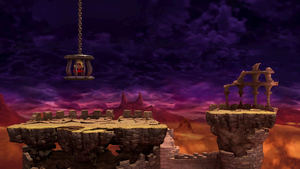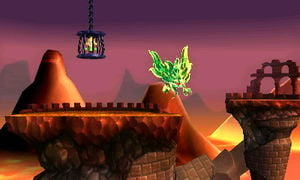| Find Mii II StreetPass™ Quest II Find Mii StreetPass™ Quest | |
|---|---|
 Find Mii as it appears in Smash. | |
| Universe | StreetPass Mii Plaza |
| Appears in | SSB4 (3DS) Ultimate |
| Availability | Starter |
| Crate type | Presents |
| Maximum players | 4 (3DS) 8 (Ultimate) |
Find Mii (すれちがい伝説, StreetPass Legend), known as StreetPass™ Quest in PAL regions, is a stage that appears in Super Smash Bros. for Nintendo 3DS and Super Smash Bros. Ultimate.
Stage overviewEdit
The stage has two main platforms; a larger, flat ground on the left, and a smaller, raised piece of ground on the right with a large gap in between.
Occasionally, the Dark Emperor appears in the background, then later comes to the stage, or retreats back to the background. While he is off the stage, the Dark Emperor may provide an upgrade or downgrade to certain characters; when this happens, a notification appears in the bottom screen detailing who was affected and how. In Ultimate, due to having one screen, the status effect is displayed above the character, with an icon on what stat has upgraded/downgraded. He can also fly into the foreground, damaging those he touches. After taking a certain amount of damage, he becomes defeated and flies back into the background, awarding the player who defeated him with a temporary stat boost. At times he can also make one of the two platforms temporarily sink into the abyss.
The characters that are affected by the stat-changing magic are determined as follows:
- In SSB4, the Dark Emperor selects one character and affects all characters using the same colour of costume (for example, all characters wearing red). The color selected is denoted by the flashing lines behind the effect text. Each costume has a defined colour based on the 12 available Mii colors, which is listed on the alternate costume page.
- In SSBU, the Dark Emperor selects characters entirely at random. One, some, or all are all possible outcomes.
A caged prince or princess Mii (chosen at random from the ones saved in the system) is positioned above the left platform. This cage is solid: it can be stood on and characters can rebound on its bottom and sides when launched. Attacking the cage makes it swing it around, and when hit enough times the cage breaks, launching the Mii off into the distance with a pseudo-star K.O. The cage later reappears, containing the same Mii. Releasing the Mii in this manner will make the Dark Emperor leave the battle earlier than usual.
Ω forms and Battlefield formEdit
In Super Smash Bros. for Nintendo 3DS, the Ω form of this stage has a single platform with walls that extends below the blast line and resembles the main platform of the normal form. No Dark Emperor nor caged Mii appear.
In Super Smash Bros. Ultimate, the Ω form and Battlefield form are similar to SSB4's Ω form; however, the main platform is resized and reshaped to match Final Destination and Battlefield, respectively. The platform also does not extend below the blast line; it now floats in place. The three soft platforms of the Battlefield form are metallic and are unique to this form.
Hazards OffEdit
With hazards turned off in Ultimate, the Dark Emperor does not appear, eliminating his stat-changing magic, direct attacks, and platform-collapsing ability. In addition, the cage on the left side stays stationary and cannot be damaged or destroyed.
OriginEdit
Find Mii (known in PAL regions as StreetPass Quest) is a game included in the pre-downloaded Nintendo 3DS application StreetPass Mii Plaza. In it, the player must send Miis from other systems their 3DS has Streetpassed (or Wandering Heroes hired using Play Coins) to rescue the player's Mii, the ruler of a kingdom who has been kidnapped by otherworldly monsters. Beating it twice unlocks Find Mii II (accordingly known in PAL regions as StreetPass Quest II), the longer sequel to the game. At the beginning of Find Mii II, the ruler Mii is once again captured, this time along with their son and daughter. The ruler is imprisoned in a cage located at the Castle of Darkness, the final area of the game and the basis of the stage in Smash.
In the main quest of Find Mii II, the final boss is the Dark Lord, who is fought at Castle of Darkness - Sky Tower; in the Secret Quest of Find Mii II (unlocked by beating the main quest once), the final boss is the Dark Lord's upgraded form: the Dark Emperor, who is fought at Castle of Darkness - Roof. The platform layout of the stage is identical to how the Castle of Darkness appears on the Find Mii II world map.
In Find Mii II, the Dark Lord/Emperor's magic is not necessarily based on the twelve Mii colors. This concept is taken from the player's team of Miis - each Mii color has access to a different magic spell, varying from direct attacks to applying status effects, some of which are mandatory for progression in the game. The symbols used in Ultimate to display stat changes are taken from the Smash Run and Smash Tour modes from Super Smash Bros. for Nintendo 3DS and for Wii U, respectively.
In Ultimate, the sky is more darkly colored like Mirage Tower - Summit, the area's parallel in the original Find Mii.
GalleryEdit
Super Smash Bros. for Nintendo 3DSEdit
The Dark Emperor alongside Villager and a Mii Brawler.
Super Smash Bros. UltimateEdit
The Mii Fighters following three Pikmin on the stage.
The Dark Emperor behind Pit on the stage.
Sora, Captain Falcon, and Zero Suit Samus facing off against the Dark Emperor on the stage.
Names in other languagesEdit
TriviaEdit
- In Smash 4, this is one of the several non-Stage Builder stages that allows Final Smashes such as Great Aether and Omnislash to turn into suicidal KOs, by sending the user and victim straight to the bottom blast line. This can only occur once the Dark Emperor causes the main platform to sink, but the Final Smash must be activated before the platform is fully offscreen, since doing it too late will result in the fighters being transported above the remaining small platform.
- In Smash 4, sending the Mii cage flying before or during a time-stopping event (such as a Final Smash) can rarely make the respawned cage glitch out and constantly attempt to reposition upwards, causing the cage to wildly swing in circles.
- In Ultimate, Nikki (due to the dark background obscuring her drawings) and Nightmare cannot be summoned from an Assist Trophy unless the stage is selected in its Battlefield or Omega form. Additionally, Moltres and Kyogre can only be summoned from Poké Balls on the Battlefield and Omega forms of this stage.
- In the German versions of 3DS and Ultimate, this stage includes an exclamation point in its name, being the only stage with this trait.
- This is the only stage in the Smash Bros. series to have a trademark symbol in its name. It appears in the PAL English version.
- Find Mii and Golden Plains are two stages from Super Smash Bros. for Nintendo 3DS where UI accommodations were made for the transition to Super Smash Bros. Ultimate due to same-screen multiplayer. In Super Smash Bros. for Nintendo 3DS, information about stat changes would be displayed on the bottom screen; in Ultimate, they are now displayed by a symbol and colored aura surrounding the affected fighter(s).
- In Ultimate, Find Mii is one of the few stages that doesn’t include either of its original Smash Bros. remixes as a main or alternate track.
- Also in Ultimate, Find Mii is one of the few stages based on a first-party or second-party game to feature a song from a third-party series as an alternate track.
| StreetPass Mii Plaza universe | |
|---|---|
| Stage | Find Mii |
| Enemy | Ghost |
| Other characters | Dark Emperor |

